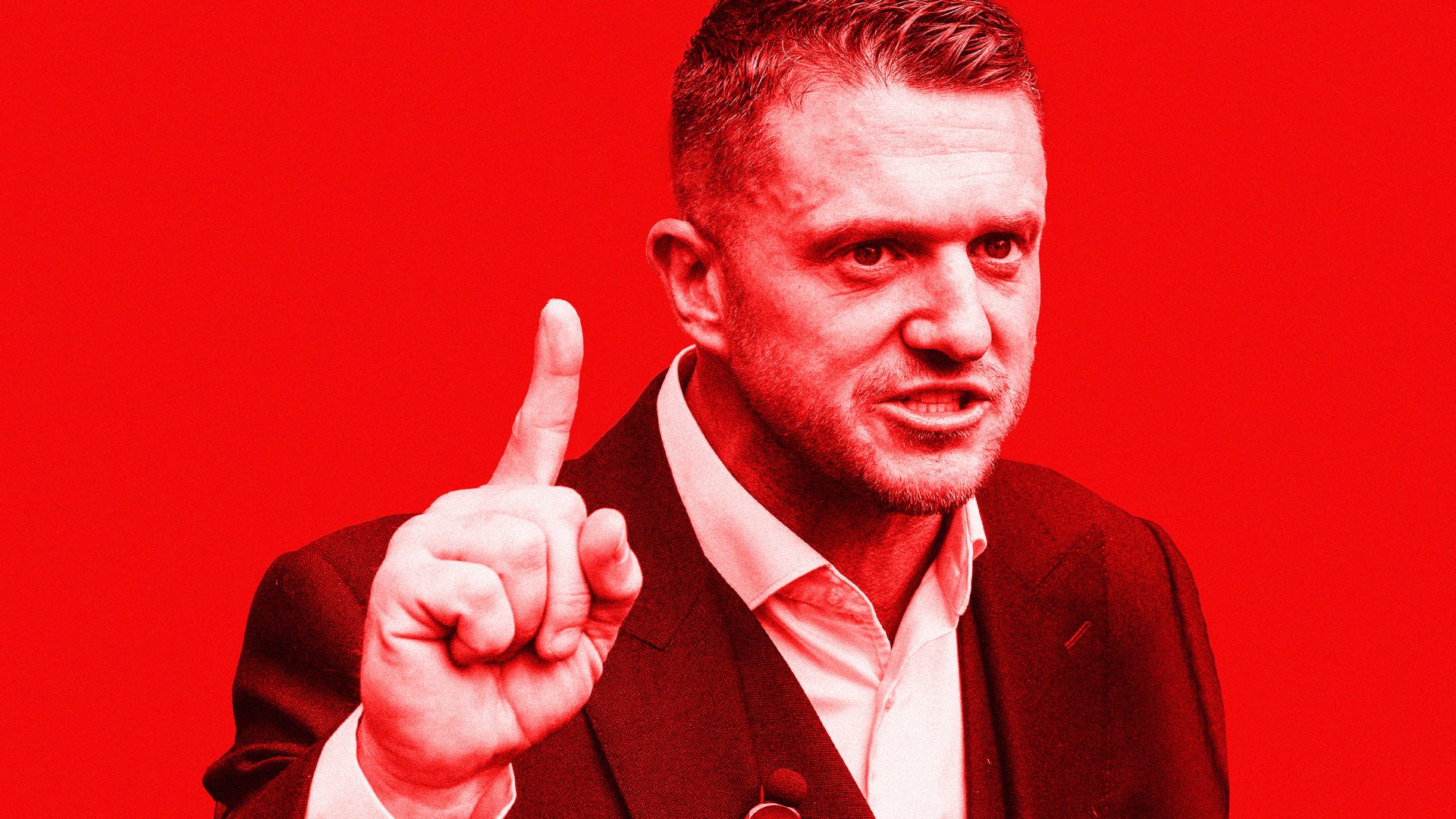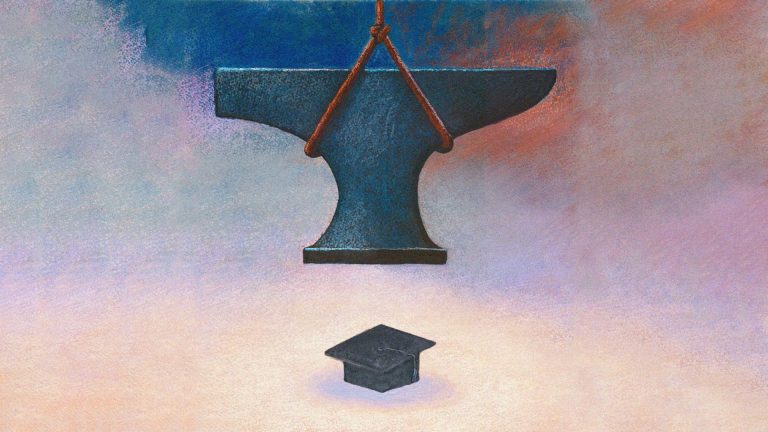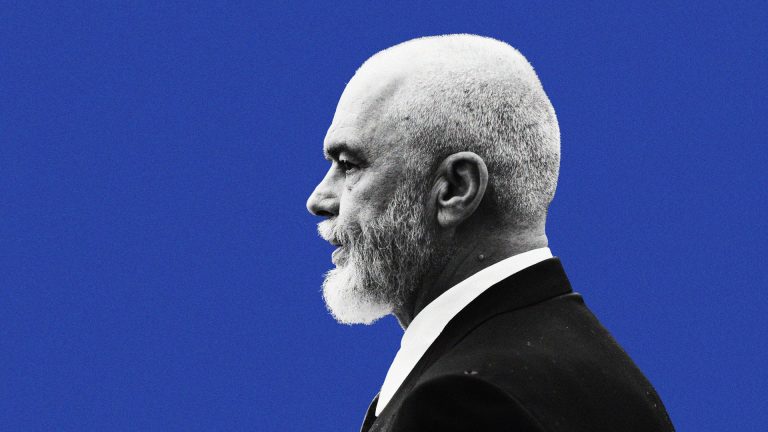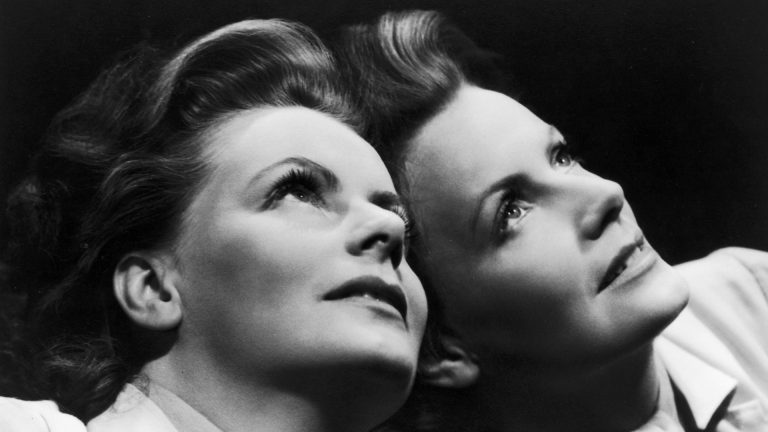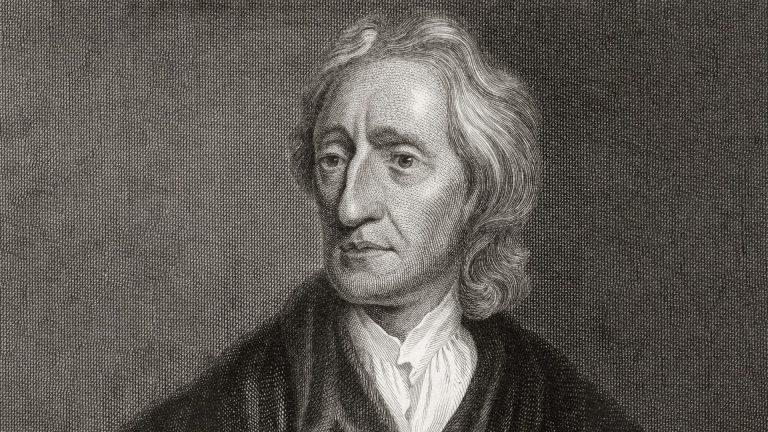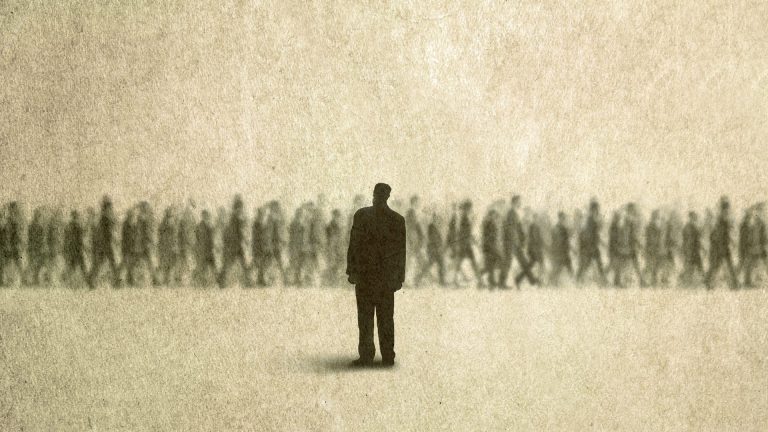Stephen Yaxley-Lennon, aka Tommy Robinson, has been resurrected.
Bearded, long-haired and with a cross around his neck, he appeared outside HMP Woodhill on Tuesday, out of jail after serving seven months for contempt of court.
No doubt to some of his supporters, he might have appeared messianic, though some on social media thought he more closely resembled Marv the hapless burglar from Home Alone, or the hairy Frankenstein-alike Oddbod from Carry On Screaming.
Robinson then delivered his sermon, a rambling 20-minute monologue for a crowd of supporters, streamed on X. Appearing to suggest that he had been some kind of political prisoner who was jailed for his beliefs, he said that in all his legal troubles, “I have never been convicted by a jury.” Realists would suggest that he has never been convicted by a jury because he tends to plead guilty.
His appointments with the legal profession are far from over, however: he is due to appear at Westminster Crown Court to face separate charges of harassing a journalist.
To his many critics, Robinson is variously a dangerous far right political activist, a violent thug and a grifter who is best ignored. A bankrupt and serial jailbird, his extremist political worldview stands no chance of achieving wider support across the British mainstream. Even Nigel Farage has made it clear he wants nothing to do with him.
And yet to his supporters, Robinson is an unjustly accused patriot (and now, it seems, a devout Christian) who exposes wrongdoing that would otherwise go unpunished by a compromised state. Everywhere he goes, Robinson seems to be followed by the cameras, while his messages spread across social media with a disconcerting, dark energy.
Some of those messages have reached into the centres of global power. For a moment, Elon Musk took Robinson up as a cause celebre, apparently mistaking the street-brawling thug for a principled champion of free speech. Several reports even suggested Musk had even paid Robinson’s legal fees, though each of his posts immediately after being released contained a link so followers could donate to cover his laywers’ bills.
Robinson was jailed for repeating false allegations about a Syrian refugee, who had successfully sued him for libel. Outside Woodhill, he said: “I have to say a thank you to Elon Musk, because without X, if we didn’t have X, everyone would just think I lied. No one would have got any other narrative.”
He praised the way X has allowed him to spread information – some of it provably and dangerously false – as “free speech” and announced a free speech rally to be held in London on September 13, promising that representatives from inside the heart of Donald Trump’s MAGA movement will appear alongside him.
There is no doubt that, like Trump, Robinson is a gifted self-promoter who achieves this through combining aspects of both the demagogue and the grifter. Both character types aim to exploit others, but their goals differ. Demagogues manipulate public opinion to gain political power. Grifters often use similar manipulation techniques to seek financial gain.
Robinson attacks on both fronts. The historian Reinhard Luthin defined a demagogue as “a politician skilled in oratory, flattery and invective; evasive in discussing vital issues; promising everything to everybody; appealing to the passions rather than the reason of the public; and arousing racial, religious, and class prejudices”. It is Robinson to a T.
Demagogues usually advocate immediate, forceful action to address a crisis (often one of their own invention), while accusing opponents of weakness or disloyalty. They set themselves in opposition to elites, emphasising a connection with the people, manipulating this connection for their own political ambition. They attempt to break established rules of behaviour, institutions, and the law. They persuade by appeals to the passions, shutting down reasoned debate.
That’s Robinson all over. But there are plenty of crackpots in UK politics making arguments of this sort – so why is Robinson so successful among those he appeals to? His life story doesn’t suggest a man of political substance.
In his autobiography, Enemy of the State, he describes gang fights at his school in Luton, between gangs split down racial lines. Family and friends were involved in football hooliganism.
According to Robinson, “You find your identity in it [football]. It’s a culture. All the lads I’ve become friends with were at football.” When asked about his own propensity for violence, he told the Huffington Post, “I’ve always gotten borderline, into scraps and that as a youth.”
Robinson cites the 1995 murder of Mark Sharp in Luton by a gang of Asian men as having a profound influence on him. After school, he applied to study aircraft engineering at Luton airport, qualifying in 2003, but he lost his job when he was convicted of assaulting an off-duty police officer while drunk, for which he served a 12-month prison sentence.
After prison, Robinson joined the fascist British National Party (BNP), citing the 2004 Islamic terrorist attack on a school in Beslan, Russia, as motivation. As well as this “political career”, by 2007 Robinson had a plumbing outfit, a tanning salon and a portfolio of rental properties. A property developer friend gave him “some backhanders”; cheap properties repossessed from the bank, that Robinson rented out. The businesses were not registered under the name Tommy Robinson. That identity was born in 2009.
Suggested Reading
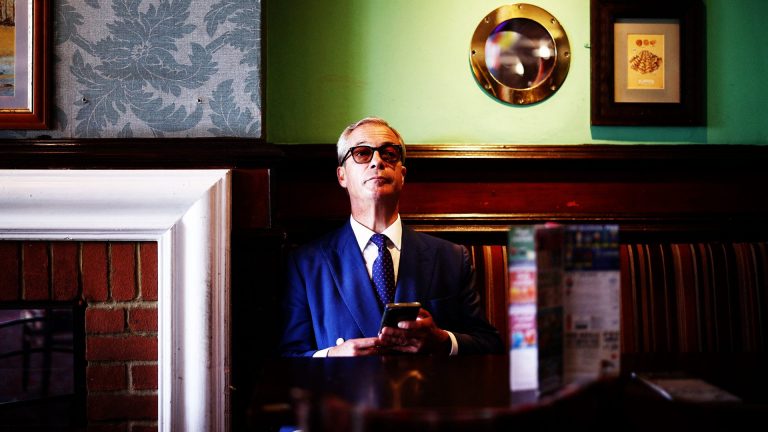

The hard right will tear itself apart
In March 2009, about a dozen people from Ahlus Sunnah wal Jamaah (a splinter group of the Al-Muhajiroun Islamist group) protested at a homecoming parade In Luton by soldiers who had been serving in Iraq. They shouted “terrorists” and held placards saying “butchers of Basra”.
In response, using the alias Tommy Robinson for the first time – a name taken from a prominent Luton Town football hooligan – he started the United People of Luton (UPL), and soon after co-founded the English Defence League (EDL), which quickly grew to being the most prominent far right group in the UK. He led the EDL until 2013, his own profile rising dramatically.
According to Robinson, his name “just depends where you met me”. He has used Andrew McMaster, Wayne King (“it sounds like wanking, when you say it”), and Stephen Lennon. In 2012 Robinson tried to enter the US on a friend’s passport (he would not have been granted entry on his own because of a conviction for possessing a Class A drug). Sentencing him in 2013, the judge noted that the name on Robinson’s legitimate passport was Paul Harris.
Over the next decade, the spread of Robinson’s influence from Luton outwards across international far right networks was accompanied, but not hindered, by several arrests. In 2013, he pleaded guilty to mortgage fraud. In 2015, he was involved with the far right Pegida movement in Germany, trying to develop a UK offshoot of Pegida.
In 2018, he violated a court order by live-streaming defendants entering court, and then went on to the US far right Infowars website, hosted by Steve Bannon, to appeal for political asylum. Bannon called him “the backbone of Britain”.
In 2018, a man called Darren Osborne drove a van at worshippers leaving the Finsbury Park mosque, killing one person and injuring several others. Mark Rowley, the assistant commissioner at the Met, commented at the time: “He had grown to hate Muslims largely due his consumption of large amounts of online far-right material including, as evidenced at court, statements from former EDL leader Tommy Robinson, Britain First and others.”
Robinson said he was “insulted” by any association, and denied the link. At around this time, he also served as an adviser to Ukip, in its post-Farage phase.
Robinson’s finances, never fully transparent, have also drawn attention. In 2022, he admitted gambling losses of £100,000 before declaring bankruptcy. The Times claims he owes approximately £2,000,000, and is the subject of an HMRC investigation. Robinson has said he owes approximately £160,000 in unpaid taxes.
Yet Robinson has also emulated far right figures from the US by being rewarded for his views via donations from supporters. Hope Not Hate has claimed he has access to up to £3,000,000 through properties, investments, donations and book sales. He was on holiday at a five-star resort in Cyprus when the 2024 Southport riots broke out, urging on his supporters with a stream of anti-Muslim invective, posted to his X account as he lounged on a sunbed.
None of which adds up to a resumé of an aspirational figure. Added to which, there have also been moments of ideological confusion, as in 2013 when he announced he was leaving the EDL in a joint press conference with the counter-extremism think tank Quilliam. It appeared to be a moment of personal rehabilitation, but Robinson later claimed they had paid him so they could take credit for his sudden change of heart.
Despite the profile and the notoriety, Robinson himself has never become a true political force and it seems unlikely that even his rampant self-promotion will ever lead to a position of political power. It is, however, making it easier for genuine demagogues to gain support at the polls. Farage has parroted several of Robinson’s views while distancing himself from Robinson the individual in an attempt to leverage the power of his invective.
Even without political success, there are concerns that men like Robinson and the influencer Andrew Tate, through “alt right” channels, can influence young men, and to a lesser extent women, inspiring misogyny, Islamophobia and racism, and in some cases violence.
This year, the Children’s Commissioner for England released a report on the 2024 riots. In a series of interviews, Dame Rachel de Souza found that children who took part in the riots were primarily driven by curiosity and the “thrill of the moment” rather than far right ideology and social media misinformation – the culprits blamed initially by the authorities. Her report noted that poverty and a lack of opportunities in their communities also contributed to the rioters’ involvement.
The truth is that humans need more than the satisfaction of our base desires. We strive for status, belonging, and meaning, some more than others. We can find these in the service of political parties, religious creeds, non-nation-state groups, in the pursuit of wealth and possessions, in the creation of art and music, in building a family or a network of friends, and in adventure and thrill-seeking. When other opportunities to achieve status, belonging, and meaning are limited, the risk that increasing numbers of people will turn to the thrill of violence, law-breaking and other temporary highs will increase.
A study led by the psychologist Dr Birga Schumpe supports the report’s insights. Previous research linked people’s search for meaning with their willingness to use violence for a cause; Schumpe’s research suggests that the search for meaning is strongly associated with a need for excitement, which, in turn, is associated with greater support for violence.
Many who join extremist groups are looking for a cause, be it a football club, country or religion. It provides a justification for them to embark on adventure, an excuse for violence and, while it can also be an attempt to find status, at the same time it provides an excuse for a lack of it. The motivation to join terrorist organisations, gangs or football hooligan firms is not so different from that of those who join the police and military. This desire for adventure, for the thrill of the moment, is symptomatic of deeper needs that we all possess.
We should stop those spreading right wing extremist content just as we stop those spreading extremist Islamist content. The historian Tom Holland is right when he compares Robinson to the radical Islamist preacher Anjem Choudary, first jailed in 2016 and now serving a life sentence for terror offences.
“There are loads and loads of people who hate Islam and shout on Twitter, and whoever hears of them?” said Holland. “It’s the same as radical Muslims – it was Anjem Choudary who became their voice. Both of them are very talented, smart people, who have the charisma that enables them to become the lightning rod.”
But we should ask, who is the lightning rod for? The media, certainly. Disturbed individuals like the Finsbury Park Mosque attacker? Potentially.
Those who took part in wide-scale rioting and those spoiling for a fight on a Saturday night in town centres around the country, the young men hyped up on coke, alcohol and gambling, lacking lasting purpose, meaning, belonging and economic status? They see themselves in Robinson – but they weren’t created by him.
Robinson gives us an excuse to ignore elements deep in our nature that we would perhaps want to leave unexamined. That way, we can look at the extremism that haunts our public life and blame it on a few odious bogeymen.
So long as we continue to do that, men like Tommy Robinson will refuse to be flushed away.

